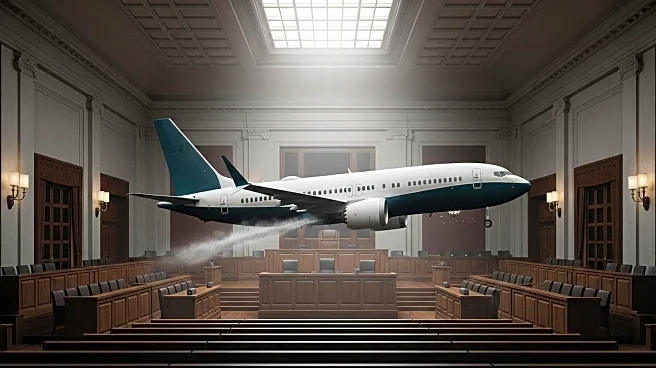What's Happening?
Five cases related to the 2019 crash of a Boeing 737 MAX8 in Ethiopia are scheduled for trial on November 3 in Chicago's federal district court. The crash resulted in the deaths of 157 people, and Boeing has
accepted full responsibility for the incident. However, mediation attempts have failed, prompting the cases to proceed to trial. The cases involve international plaintiffs, including families from Kenya, India, Yemen, the UK, and Ireland, who lost loved ones in the crash. Robert A. Clifford, lead counsel and founder of Clifford Law Offices, will represent the plaintiffs, seeking justice and compensation for the families affected by the tragedy.
Why It's Important?
The trial is significant as it addresses accountability and compensation for the victims' families, highlighting the broader implications of corporate responsibility in aviation safety. Boeing's acceptance of responsibility underscores the importance of safety standards and regulatory compliance in the aviation industry. The trial also serves as a reminder of the human cost of technological failures and the need for rigorous oversight to prevent future tragedies. The outcome could influence future litigation strategies and corporate policies regarding safety and crisis management.
What's Next?
As the trial date approaches, both sides are preparing for legal proceedings that could set precedents in aviation litigation. The trial's outcome may impact Boeing's reputation and financial liabilities, potentially affecting its operations and stock market performance. The case may also prompt discussions on improving aviation safety standards and regulatory frameworks to prevent similar incidents. Stakeholders, including aviation authorities and industry experts, will be closely monitoring the trial for insights into safety practices and corporate accountability.
Beyond the Headlines
The trial highlights ethical considerations in corporate governance and the balance between profit and safety. It raises questions about the adequacy of existing safety regulations and the role of corporate leadership in crisis management. The emotional toll on the victims' families adds a human dimension to the legal proceedings, emphasizing the need for empathy and justice in addressing such tragedies. The case may also influence public perceptions of aviation safety and corporate responsibility, potentially leading to increased scrutiny and demands for transparency in the industry.











